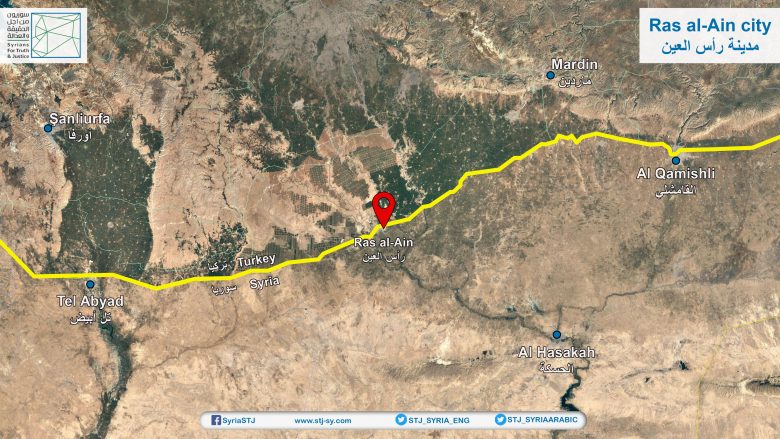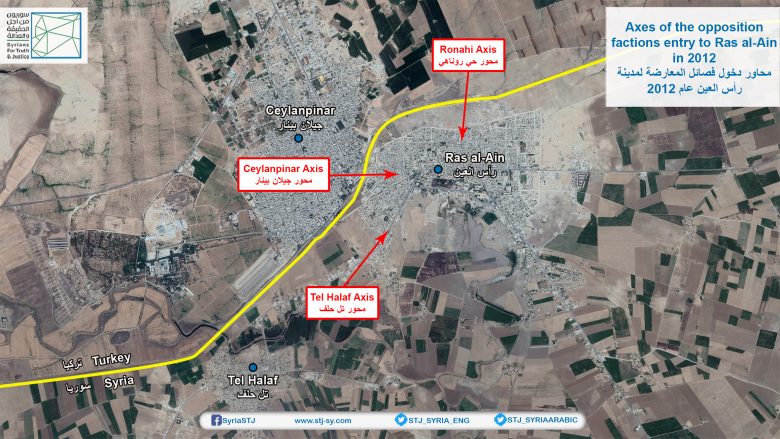1. Executive Summary:
Today—November 8, 2019— marks the 7th anniversary of the spark that catalyzed the clashes witnessed by the city of Ras al-Ayen/Sari Kani in al-Hasakah province, northeast Syria, in 2012, an area that abounds with ethnic and religious diversity, where different religious and ethnic groups live and exist side-by-side, including Syriac Assyrians, Kurds, Arabs, Armenians and Chechens, while it sets an example of civil peace and coexistence.
Adjacent to the Turkish border strip, the city fell to the hold of the Autonomous Administration in northeast Syria, taken over by the People’s Protection Units/YPG, after the Jabhat al-Nusra/al-Nusra Front/al-Qaeda was expelled from it, on the heels of the Syrian opposition-affiliated armed groups, which controlled the city in 2012 in the aftermath of some days long battles with the Syrian regular forces, which at the date maintained a mere symbolic presence in the area.
Between November 2012 and September 2013, the city of Ras al-Ayen/Sari Kani changed from being a safe area into an open front for military struggle, bearing witness to a rising action every now and then. Many observers attributed this shift to the city’s strategic importance, for it is the “gate to the Syrian Jazira”, on the northeast of the country, known for its wealth of oil and other riches, which the armed opposition groups, Jabhat al-Nusra/al-Nusra Front and Daesh/Islamic State/ISIS, later on, sought to get hold of at all costs.
The 2012 clashes broke out when opposition-affiliated armed groups and other hardliner Islamic groups, most notably Ghuraba al-Sham Brigades[1] and Jabhat al-Nusra/al-Nusra Front, forced their way into the city of Ras al-Ayen/Sari Kani on November 8, following which the Syrian Government Air Force aimed at the city with several air raids, sending many of its families on a flight of displacement to other areas or to Turkey as a place of refuge. The city then became a landscape for a fresh series of confrontations that brought these groups against the Kurdish People’s Protection Units/YPG.
The clashes were matched with several violations and practices by the opposition-affiliated armed groups against the locals who remained in the city, ranging from abduction, holding civilians as captives and using them as hostages to looting and confiscation of public and privately-owned properties, not to mention the artillery shelling. The city also bore witness to airstrikes, conducted by the Syrian regular forces, due to which several civilian casualties were recorded. These violations, committed by so-and-so sides, took a toll on dozens of innocent civilians.
As reported by numerous sources, the armed groups which took part in the attack against the city, particularly those affiliated with the opposition, were granted significant support by Turkey, especially since the latter has openly hosted the injured of these armed groups at its hospitals, while it provided the groups with food and ammunition via the border crossing, through which Turkish ambulances would pass back and forth to the city, entering it with loads of weapons and ammunition and carrying aboard the wounded militants of the armed opposition groups on their way out, to provide them with medical care, according to several of the city’s residents and eyewitnesses.

Photo no. (1)
2. Immediate Turkish Intervention to Regain Control over the City in 2019:
In 2019, the city of Ras al-Ayen/Sari Kani was turned into a front for military action once again. On October 9, 2019, the Turkish forces, backed by the factions of the Syrian National Army/SNA, operating under the armed opposition, have embarked on a military operation decoded Peace Spring[2] in northeast Syria, aiming to establish a safe zone on its southern borders, where two million Turkey-based Syrian refugees are to be housed.[3]
At the onset of the Turkish military operation in the city of Ras al-Ayen/Sari Kani, the majority of the area’s population was rendered displaced, amounting to nearly 50,000 persons, after the city was subjected to airstrikes and artillery shelling on the part of Turkey and the Ankara-backed militants of the Syrian National Army, which preceded the escalation of the clashes with the Syrian Democratic Forces/SDF that attempted to combat the Turkish offensive as dozens of civilians were stuck in the confrontation areas inside the city.
Up to October 17, 2019, Turkey, supported by the factions of the Syrian National Army, managed to impose a suffocating siege on the city and to take over almost half of it. The shelling that accompanied the Turkish offensive against the city resulted in dozens of civilian casualties. The Autonomous Administration, for its part, accused[4] Turkey of using internationally prohibited/banned weapons during the offensive, after it documented burns sustained by cases rushed to the hospital in the town of Tall Tamr. While the Turkish Ministry of Defense denied[5] these accusations, no mandated independent international committee succeeded to investigate into the use of internationally prohibited weapons by Ankara and the factions it backs to the date this report was written.
On October 17, 2019, Turkey concluded an agreement[6] with the U.S. providing for the suspension of the Turkish military action in northeast Syria for (120) hours and the withdrawal of the SDF into a depth of (32) kilometers. However, the SDF accused Turkey and the factions of the Syrian National Army of violating the Ankara-Washington agreement several times, for the city of Ras al-Ayen/Sari Kani was subjected to a Turkish artillery and aerial shelling.
Under the US-Turkey deal, the SDF announced[7] the withdrawal of all its forces from the city of Ras al-Ayen/Sari Kani on October 20, 2019, after which another announcement was made, however, by the NFL-affiliated armed groups, which Turkey backs, declaring their control of the full range of the city and massive areas of its countryside. On October 18, 2019, Amnesty International issued a report[8], in which it accused the Turkish army and its allied armed opposition groups of committing horrendous violations and war crimes, such as summary killings and unlawful attacks that have killed and injured civilians, during the offensive into northeast Syria, including the killing of the Syrian-Kurdish female politician Hevrin Khalaf, the Secretary General of the Future Syria Party.
3. Report Methodology:
In terms of methodology, the report is based on a total of (12) testimonies and interviews conducted by the field researcher of Syrians for Truth and Justice/STJ in September 2019 in person with eyewitnesses, who directly observed the events that broke out in the city of Ras al-Ayen/Sari Kani between November 2012 and September 2013. In addition to this, dozens of open sources have been referenced in the report, where these events have been documented either by means of photos, videos, reports or news articles.
4. The Armed Opposition Groups’ Clashes with the Syrian Regular Forces in Ras al-Ayen City:
These events started with the attacks undertaken by Syrian opposition-affiliated groups on the city of Ras al-Ayen/Sari Kani at the dawn of November 8, 2012, which aimed to take it over and ripe it out of the Syrian regular forces’ grip that operated only symbolically in the city back then. The majority of the city’s population, however, was not satisfied with the attacks, despite the fact that Ras al-Ayen/Sari Kani was one of the Syrian cities that witnessed persistent peaceful anti-government demonstrations in 2011, the first of which was organized on April 8, 2011, less than a month into the breakout of the protests in Syria.
According to STJ’s field researcher, the residents of Ras al-Ayen/Sari Kani have met the invasion of the opposition armed groups of their city with contempt for several reasons, including the fact that the city, at the time, was a shelter for dozens of families displaced from other[9] Syrian areas and that the Syrian regular forces were not holding an active position in the area, for their presence was limited to a number of volunteer security militants and the guards of the security centers only. Who had an active role in the city, contrastingly, were actually the Kurdish National Council in Syria[10], the People’s Council of Western Kurdistan[11], both are Kurdish entities, in addition to several coordination offices and opposition revolutionary movements, as well as military and security forces which back then were recently formed, such as the People’s Protection Units/YPG and the Asayish/Domestic Security[12].
On a different note, the civilian residents were worried and scared of the repercussions that might be effected by the armed opposition groups’ control of the city, manifested in battles and ongoing shelling, similar to what happened in Syrian cities previously taken over by the armed opposition groups, which should have been prioritized over the city of Ras al-Ayen/Sari Kani when it comes to the armed groups’ support, according to the city’s residents, the majority of whom shared the opinion that the city refuses to recognize all military forces and that its struggle is based on the principle of peace alone.
4.1. Civilians Gunned down by Armed Opposition Groups:
After the 8th of November 2012, Ras al-Ayen/Sari Kani never resembled the city it was a day before, for at 3:00 a.m. on that day, hundreds of militants, affiliated with armed opposition groups, invaded the city, headed by the Ghuraba al-Sham Brigades and Jabhat al-Nusra/al-Nusra Front. The incursion took place on three fronts — on the side of the border town of Tell Halaf, located 5 kilometers to the west of the city, through the Turkish border on the side of the Ronahi Neighborhood to the north of the city, and finally through the border crossing that separates the city of Ras al-Ayen/Sari Kani from the Turkish city of Jilan Binar, which has been closed for a long time on both sides of the Syrian-Turkish border strip. In a video[13], posted on YouTube channels on November 8, 2019, the attacker armed groups announced storming the city of Ras al-Ayen/Sari Kani, al-Hasakah Province, and “liberating the area from the grip of the Syrian regular forces,” as the announcement indicated.

Photo no. (2)
You may read and download the full version of this report (61 pages), in PDF format by clicking here.
[1] Ghuraba al-Sham Brigades: An Islamic group founded in Aleppo Province following the break out of the armed conflict in Syria. The group was brought to existence by Hamoud Ghoul Aghassi (Abu al- Qa’qa’), originally from Aleppo Province, who was involved, as many sources indicate, in the creation of the initial nucleus of al-Qaeda Organization in Iraq through sending volunteer recruits to Iraq and al-Fallujah. The group encompassed 22 brigades under the command of Sheikh/Scholar Omar Hilal, a former jihadist who participated in the Iraq War in 2003. Most known of these brigades was the Toyour al-Ababil/ Abābīl Birds, led by Hassan Jazarah, who was executed along with six of the brigade’s militants, as each of them received a bullet in the head by the Islamic State/ISIS/Daesh at the square of the al-Atārib town, rural Aleppo, in late November 2013 on the charges of looting and pillage. The Ghuraba al-Sham Brigades was dissolved in 2014.
[2] “Erdogan: Turkey to Launch Military Operation in Northeastern Syria.” Anadolu Agency, October 5, 2019. Last visited: November 4, 2019. https://www.aa.com.tr/ar/%D8%A7%D9%84%D8%AF%D9%88%D9%84-%D8%A7%D9%84%D8%B9%D8%B1%D8%A8%D9%8A%D8%A9/%D8%A3%D8%B1%D8%AF%D9%88%D8%BA%D8%A7%D9%86-%D8%A3%D8%B5%D8%AF%D8%B1%D9%86%D8%A7-%D8%AA%D9%88%D8%AC%D9%8A%D9%87%D8%A7%D8%AA-%D9%84%D8%A5%D8%B7%D9%84%D8%A7%D9%82-%D8%B9%D9%85%D9%84%D9%8A%D8%A9-%D8%B9%D8%B3%D9%83%D8%B1%D9%8A%D8%A9-%D9%88%D8%B4%D9%8A%D9%83%D8%A9-%D8%B4%D8%B1%D9%82-%D8%A7%D9%84%D9%81%D8%B1%D8%A7%D8%AA/1603022.
[3] “Erdogan: We can no longer hold back on the condition in eastern Euphrates.” Anadolu Agency, October 1, 2019. Last visited: November 4, 2019. https://www.aa.com.tr/ar/%D8%A7%D9%84%D8%AF%D9%88%D9%84-%D8%A7%D9%84%D8%B9%D8%B1%D8%A8%D9%8A%D8%A9/%D8%A3%D8%B1%D8%AF%D9%88%D8%BA%D8%A7%D9%86-%D9%84%D9%85-%D9%8A%D8%B9%D8%AF-%D8%A8%D9%85%D9%82%D8%AF%D9%88%D8%B1%D9%86%D8%A7-%D8%A7%D9%84%D8%A7%D9%86%D8%AA%D8%B8%D8%A7%D8%B1-%D8%AD%D9%8A%D8%A7%D9%84-%D8%A7%D9%84%D9%88%D8%B6%D8%B9-%D9%81%D9%8A-%D8%B4%D8%B1%D9%82%D9%8A-%D8%A7%D9%84%D9%81%D8%B1%D8%A7%D8%AA/1599068.
[4] For further information, refer to: https://www.facebook.com/952306884959249/posts/1130589620464307/.
[5] “Turkish Forces Did Not Use Internationally Banned Weapons during Operation Peace Spring, Ankara Confirms.” Turkpress, on October 21, 2019. Last visited: November 4, 2019. http://www.turkpress.co/node/65713?fbclid=IwAR3ufYpGAR4rE5GVwd8_EMc_k7G4qmIc6oj6yiH-eeQMKFjnhVL-JyRfwP0.
[6] “New op in Syria not necessary: Turkish Defense Ministry.” Anadolu Agency, on October 23, 2019. Last visited: November 4, 2019. https://www.aa.com.tr/en/operation-peace-spring/new-op-in-syria-not-necessary-turkish-defense-ministry/1623206.
[7] “SDF Forces Withdraw from Ras al-Ayin Putting into Force the Deal with Turkey.” Arabic CNN, on October 21, 2019. Last visited: November 4, 2019. https://arabic.cnn.com/middle-east/article/2019/10/21/syria-sdf-turkey-safe-zone-kurds.
[8] “Syria: Damning evidence of war crimes and other violations by Turkish forces and their allies.” Amnesty International, on October 18, 2019. Last visited: November 4, 2019. https://www.amnesty.org/en/latest/news/2019/10/syria-damning-evidence-of-war-crimes-and-other-violations-by-turkish-forces-and-their-allies/.
[9] Such as Aleppo, Homs and Daraa, over the control of which the armed opposition groups and the Syrian regular forces were clashing.
[10] The Kurdish National Council in Syria: An opposition political coalition founded on October 26, 2011, encompassing 14 Kurdish political parties, most notably back then were the Kurdistan Democratic Party of Syria/ PDK-S-the Party, the Kurdish Democratic Unity Party in Syria-Yekiti, the Kurdish Democratic Progressive Party in Syria, Yekiti Party of Kurdistan in Syria and the two factions of the Kurdish Azadi Party in Syria, in addition to members of the civil society organizations, coordination offices, youth revolutionary movements and independent personalities. On August 27, 2013, the Kurdish National Council joined the National Coalition for Syrian Revolutionary and Opposition Forces and started to foster the Rojava Peshmerga Forces in 2015 — an armed military unit of the Syrian Kurds, founded in Iraqi Kurdistan following the breakout of the armed conflict in Syria and is yet spreading there.
[11] The People’s Council of Western Kurdistan: It was founded in December 2011, with its core being the Democratic Union Party/PYD in Syria, which is known for having close ties with the Kurdistan Workers’ Party/PKK. The council was formed in support of the peaceful democratic popular movement, seeking to change the very roots of the regime, at the levels of institutions and fundamentals, as highlighted in the conclusive statement of its first conference, held on December 19, 2011.
[12] A military force founded by the People’s Council of Western Kurdistan, the core of which is the Democratic Union Party/PYD.
[13] A video, through which the opposition armed groups declared storming the city of Ras al-Ayen/Sari Kani on November 8, 2012. https://www.youtube.com/watch?v=bTREsipsR8c&feature=youtu.be&fbclid=IwAR0WRpmy4_G-9nW-RzjzDsDfK9HyeyJrhP7KOAC3u8hg6oBsxWa-exk9ufw.


2 comments
[…] Fuente: Syrians for Truth and Justice […]
[…] al-Ayn/Serê Kaniyê and Tell Abyad. Since late 2012, this same area has been subjected to several attacks by different armed groups, the last of which was the Islamic State […]